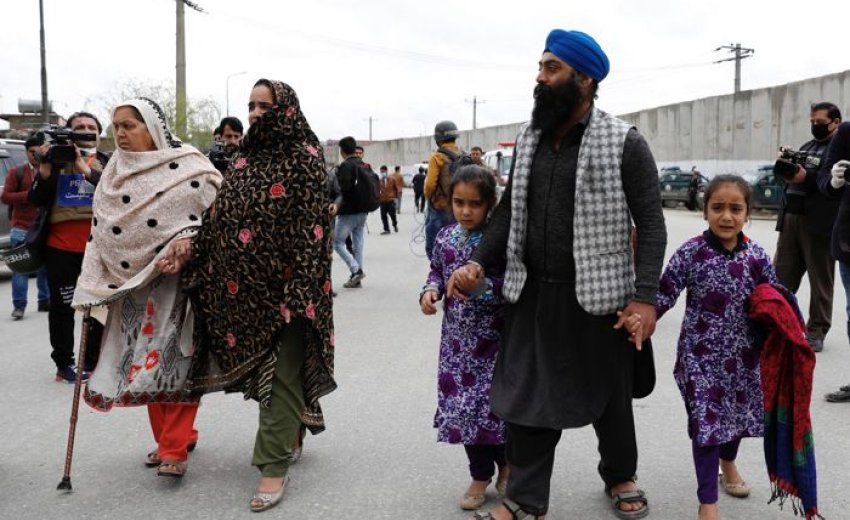When Sikh community leader Hakam Cha Cha Singh leaves his Kabul house for work each day, he bids his family goodbye as if it were the last time, unsure whether he will return home safely. This is an instance recounted by a white-bearded Sikh man living in Afghanistan, where struggling minorities endure daily bigotry, harassment, and brutality from militant organizations.
There was a time when people used to travel from one province to another even during the middle of the night safely. Despite the insecurity they face, the Sikh man said, “But still we love Afghanistan.”
Hakam Cha Cha Singh is a member of Afghanistan's rapidly decreasing minority, thousands of whom have escaped conflict and settled in nations such as India, their spiritual homeland, or Canada and Germany over the last four decades.
Sikhism in Afghanistan
In the present times, Sikhism in Afghanistan is limited to small populations, primarily in major cities, with the largest numbers of Afghan Sikhs living in Jalalabad, Ghazni, and Kabul. To a lesser extent, they also live in Kandahar and Khost. The origin of the Sikh community in Afghanistan comprises two main parts, including Pashto and Dari-speaking natives who converted to Sikhism during Guru Nanak's 1520 visit to Kabul to spread his teachings.
The second stream stems from the later Sikh Empire's westward expansion, which established trading routes for Sikh merchants into Kandahar and Kabul. This population speaks Hindko, a Punjabi dialect. Afghan Sikhs come from various ethnolinguistic origins, including Pashtun, Hindkowan, and Punjabi, as a result of their mixed lineage.
Effect of war and disturbances on the Sikh community
Before a devastating civil war in the 1990s, Afghanistan was home to as many as 250,000 Sikhs and Hindus, despite being almost an exclusively Muslim country. For years, Hindu and Sikh populations in Afghanistan were influential in merchant commerce and moneylending, albeit they now largely manage medicinal herb shops.
The Sikh community, which was originally scattered over the country, is now concentrated in the eastern provinces of Nangarhar, Ghazni, and Kabul.
There are only about 300 Afghan Sikh households. It only has two gurdwaras, or places of prayer, one in Jalalabad and one in Kabul.
In 2018, an explosion in the eastern Afghan city of Jalalabad killed at least 20 people, including several members of the country's small Sikh population, prompting hundreds to flee. Avtar Singh Khalsa, the only Sikh candidate contesting in Afghanistan's forthcoming parliamentary election, was among those dead.
Many Sikhs claim that local Muslim hardliners have incited animosity toward them, and the community now requires police protection during funeral rites.
State of Sikhs in Afghanistan
While the majority of Sikhs who stay in Afghanistan are concerned about religious persecution and lack of economic prospects, other Sikhs, particularly those with land or companies and no ties to India, claim they do not intend to leave and consider Afghanistan to be their "motherland."
The 31-year-old Gajandae Singh Bashardost, who runs a traditional medicinal herb shop in the once-bustling Sikh neighborhood of Karte Parwan, said that they have suffered a lot. It has affected honor and property. Also, it has put lives in danger, but still, for those who live there, Afghanistan is still home.
Earlier in February 2020, Afghanistan's Ministry of Finance set aside $650,000 for the renovation of Hindu and Sikh temple communities throughout the country.
The only Sikh member of the Aghan Senate, Anar Kali Honaryar said, “ Hindus and Sikhs love their country and despite the prejudice and discrimination do not want to leave,”
According to Zabihullah Farhang, a spokesman for Afghanistan's Independent Human Rights Commission, the level of discrimination and prejudice demonstrated towards Hindus and Sikhs has decreased in recent years. However, he stressed that the government must do more to "defend their rights, assist them to develop schools, provide health care, provide work possibilities, and give them opportunities in the government."
As reported, when the Taliban took over in August 2022, many Sikhs sought safety at the complex, living communally or in family groups distributed across the structure. Amid the ongoing tensions in the country, the dilemma to stay on or leave continues to linger in the Sikh community.
